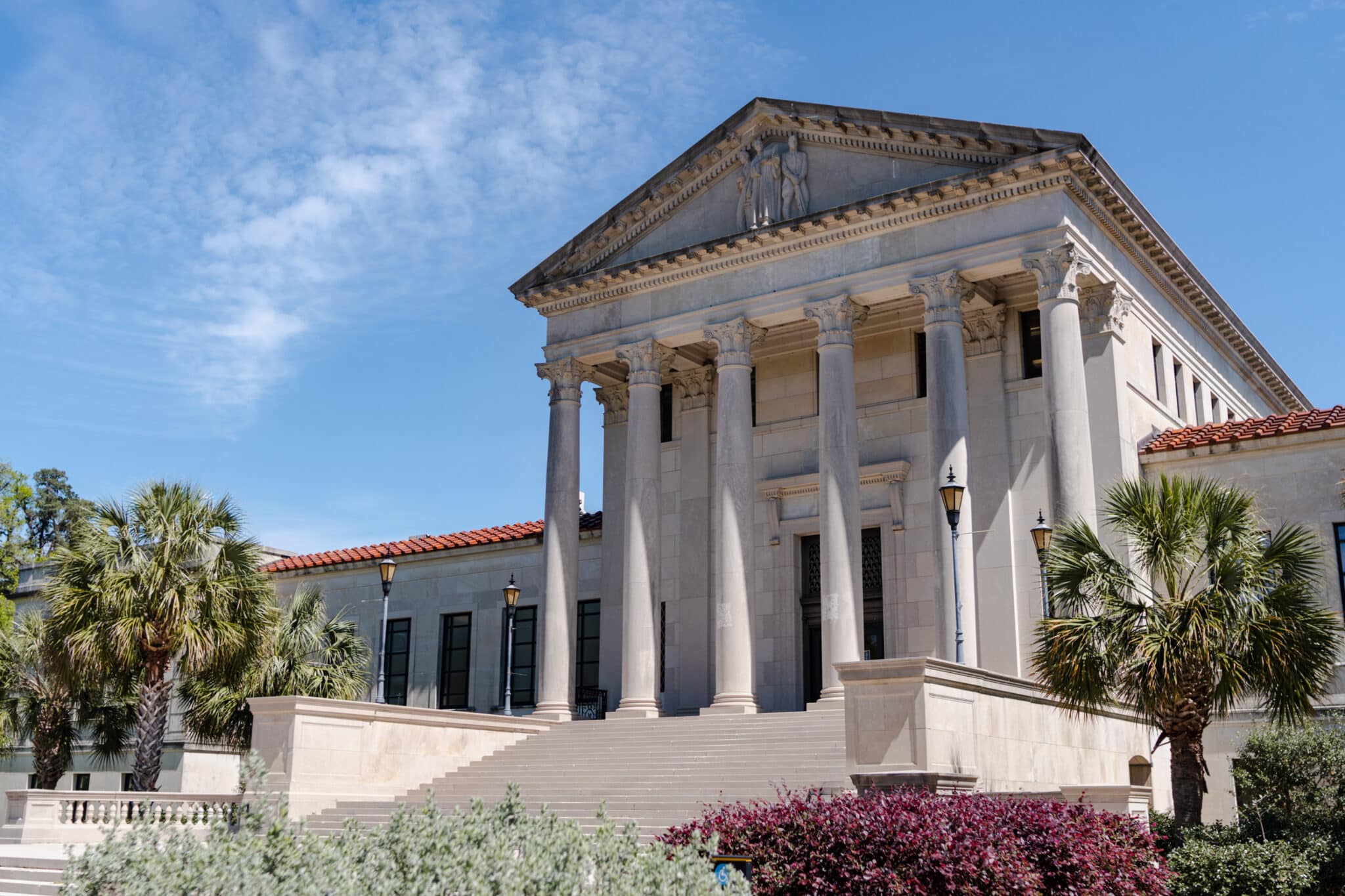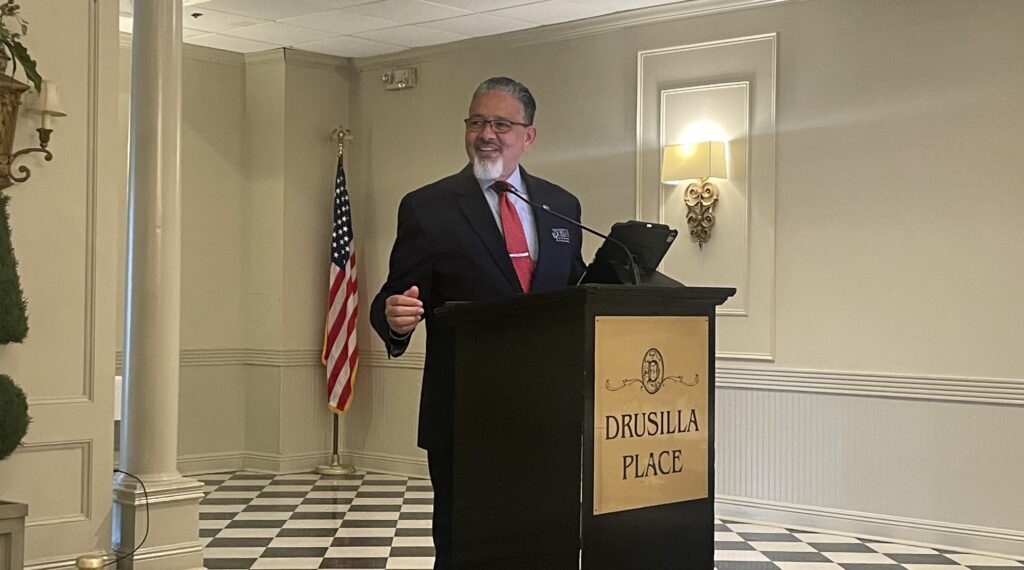News from the South - Louisiana News Feed
Gov. Landry forced to provide text messages about sidelined LSU law professor • Louisiana Illuminator

Gov. Landry forced to provide text messages about sidelined LSU law professor
by Piper Hutchinson, Louisiana Illuminator
February 10, 2025
A state judge ordered Louisiana Gov. Jeff Landry to produce text messages he sent to the chairman of the LSU Board of Supervisors about a law professor who made comments critical of the governor to his class.
The order from 19th Judicial District Judge Tarvald Smith came Monday in the case of Ken Levy, who is suing the university after being pulled from teaching last month, allegedly for remarks he made to students on the first day of class. Attorney Jill Craft, who is representing Levy, has argued his comments are protected under the First Amendment and LSU faculty policy.
Levy testified Monday he believes one of his students reported his comments to Landry, who in turn notified the university administration, something he said Law Dean Alena Allen told him. Landry has since made several social media posts about Levy.
Levy’s comments in class were openly critical of Landry and Trump and were at times profane.
GET THE MORNING HEADLINES.
Seeking to make a direct connection, Craft requested Landry’s text messages with LSU board chair Scott Ballard. In the messages, Landry sent Ballard a screenshot of a Facebook post Levy made to solicit donations to cover the cost of his lawsuit.
“Please remember – this isn’t just about me,” Levy wrote in the Facebook post. “This is about you too. If LSU (and Gov. Landry) can get away with violating my rights, they can get away with violating your rights too. So to help me is to help everybody else. If I win, we all win; if I lose, we all lose.”
While Levy’s fundraising is not at issue in the case, it was among the first things Jimmy Faircloth, an attorney representing LSU in the lawsuit, brought up when he cross-examined Levy.
Faircloth asked Levy why he was soliciting donations from students. Levy responded that it was a public Facebook post seeking support from anybody, not specifically students. Levy’s post did not mention students, referencing support from “family and friends.”
At several points during Monday’s hearing, Faircloth objected to mentions of Landry, pointing out he is not a party to the case. His objections were mostly overruled.
While Landry is not a defendant in the lawsuit, he is the head of the executive branch that includes the state’s four higher education systems. He also has appointed most of the board that oversees LSU, including naming its chair thanks to a law passed last year that gives him more authority over higher education.
Smith recessed the hearing before all witnesses could be heard. Arguments are scheduled to resume at 8:30 a.m. Tuesday. LSU President William Tate, Allen and several of Levy’s students are expected to testify.
YOU MAKE OUR WORK POSSIBLE.
Louisiana Illuminator is part of States Newsroom, a nonprofit news network supported by grants and a coalition of donors as a 501c(3) public charity. Louisiana Illuminator maintains editorial independence. Contact Editor Greg LaRose for questions: info@lailluminator.com.
News from the South - Louisiana News Feed
Easter Weekend: Muggy, warm, and windy

SUMMARY: Easter Weekend will be warm, muggy, and breezy, with mostly cloudy skies and temperatures in the low 80s. Current conditions are in the low 70s, making it a sticky day for events like the Crescent City Classic. While there’s a slight chance of rain on Sunday, most of the day will remain dry. Winds from the southeast could gust near 30 mph. Next week, a front will bring increased rain chances and storms starting Monday, with unsettled conditions continuing into Tuesday and Wednesday. Despite this, warm temperatures in the 80s will persist throughout the week.

Easter Weekend looks very nice! It will be hot, humid, and windy with high temperatures in the lower 80s both afternoons. More clouds will be around with some breaks
News from the South - Louisiana News Feed
Vicente Fernandez and Freddy Fender join National Recording Registry

SUMMARY: This year, Vicente Fernandez’s “El Rey” and Freddy Fender’s “Before the Next Teardrop Falls” were inducted into the National Recording Registry, alongside Lin-Manuel Miranda’s *Hamilton* album. Congressman Joaquin Castro has championed the inclusion of more Latino artists in the registry, noting that Latino representation is only 5%. Over the last three years, with input from constituents, Castro has successfully nominated 30 songs and albums, including iconic Latino tracks. He advocates for more Latino contributions to be recognized, including Selena’s work. Castro will continue gathering nominations for 2026, aiming to better reflect Latino cultural influence in the registry.

Each year since 2000, the Library of Congress has selected influential songs and albums to be preserved in the National Recording Registry. This year, three Latino artists were inducted — two of them with deep roots in Latino culture and South Texas.
News from the South - Louisiana News Feed
Q&A with University of Louisiana System President Rick Gallot on higher education

by Piper Hutchinson, Louisiana Illuminator
April 18, 2025
This is an interview with University of Louisiana System President Rick Gallot that took place earlier this month about how the legislative session and federal changes will impact higher education in Louisiana. It has been edited for length and clarity.
You can also listen to a version of this interview on our new podcast The Light Switch.
Piper Hutchinson: What do you think is coming for higher education this session?
Rick Gallot: I think certainly starting with a standstill budget is always better than starting with a proposed cut. So, you know, we’re certainly very grateful for that. I think there’s a lot of uncertainty, coming out of Washington and with the constitutional amendments that did not pass, obviously that has created some angst in terms of what do we do now, right? And so I think there is, again, just an overall level of uncertainty that we’ll see it … kind of play out over time.
I think if you look at the increased revenue from the sales, sales taxes and other things, we’re certainly not in a real bad spot right now as a state in terms of our finances. So I’m still optimistic that we will work through the challenges in the session, and we will come out good on the other side.
Hutchinson: Looking at the bills that we have so far, what do you think is going to be the most impactful for higher education?
Gallot: It’s hard to say, and when you look at what’s filed versus what ultimately makes it through the process; all bills filed on the front end don’t always make it. Rep. (Emily) Chenevert has come back with another diversity, equity and inclusion bill. We will certainly have to see how that plays out. The bill she had last year started one way and ended up another. … Certainly with all other higher ed leaders, she was very receptive to meeting with us and working through some of those challenges last year. At the end of the day, I think the budget is always going to be the main focus that could impact the trajectory going forward.
Hutchinson: There’s one bill that’s going to have a big impact for your system, talking about transferring UNO back to the LSU System. What should we expect on that front?
Gallot: For me personally, it’s a full-circle moment. I was in the house when UNO was transferred from LSU to the University of Louisiana System. You know, I just want what’s best for the students, for the campus community at the University of New Orleans. It is a legislative prerogative. They have the authority to transfer universities from one system to the other. So if this legislation is successful, we will certainly do our part to ensure that it is a seamless transition. We will work with LSU, with Board of Regents and with the legislature to ensure that the transition is as smooth as it could possibly be.
Hutchinson: What’s that like for you [as a former legislator] during the legislative session, being kind of outside the rails?
Gallot: Well, I certainly have a lot of respect for our legislators and the sacrifices they all make in serving. I’m a huge fan of Stephen Covey’s “Seven Habits,” and one of those is: “Seek, first to understand then to be understood.” And so I think that’s helpful to understand the pressures that our legislators are under, knowing that there’s a lot that they have to balance. I think it’s helpful, quite frankly. And I don’t think I burned any bridges while here.
I mean, I did oversee redistricting, so maybe I did [burn] one or two. But for the most part, I still have good relationships with many of my former colleagues … who are still there. I’m grateful to have the opportunity to be a part of the process but from this side.
Hutchinson: There has been a little bit of controversy in the LSU System lately, that’s reignited these conversations about curbing tenure. What are you hearing on that front, and what would that mean for higher education as a whole if they did take an axe to tenure?
Gallot: Going back to COVID, and you think about faculty members, who go through the process of, not only a bachelor’s and a master’s and a terminal degree. You know, they get hired, they’re on a tenure track, they’re researching, they’re writing, they’re building their portfolio, and at the appropriate time they apply for tenure. I think we have to respect that process.
I think it is one that is deeply rooted in higher education, and so I think we certainly have to respect faculty and that they have earned this.
Now, having said that, it’s always one or two bad apples that will spoil the barrel, as they say. I don’t know that simply doing away with tenure is the answer.
If the legislature passes something, then we, as a state system, will certainly abide by whatever changes may be made. I think we want accountability at all levels, that we want our students to be in the best position to learn. We want our faculty to be in the best position to teach, and that our students would graduate and go out and make a difference in society. So we’ll certainly be watching it closely, and hopefully we will see thoughtful debate throughout the process. And again, with whatever the ultimate result is, we will work with it.
Hutchinson: I can’t not talk about what’s going on at the federal level. We’re talking about cutting research funding. There are concerns about immigration and graduate students, and certainly tariffs could increase expenses for higher education. How is the UL System adapting to all of this?
Gallot: Right now there’s so much uncertainty just across the board. Whether it’s the potential loss of research funding and indirect cost, for instance, universities build their budgets based upon what they believe the revenue stream will be from these research grants. I’m hopeful that we will sort of get through this period of uncertainty, and we will see things sort of settle down to be a little more predictable. But you know, at the same time, we will have to adjust if the rules are changed. If the funding formulas are changed, we will just have to adapt. We always have and we always will.
GET THE MORNING HEADLINES.
YOU MAKE OUR WORK POSSIBLE.
Louisiana Illuminator is part of States Newsroom, a nonprofit news network supported by grants and a coalition of donors as a 501c(3) public charity. Louisiana Illuminator maintains editorial independence. Contact Editor Greg LaRose for questions: info@lailluminator.com.
The post Q&A with University of Louisiana System President Rick Gallot on higher education appeared first on lailluminator.com
-

 Mississippi Today6 days ago
Mississippi Today6 days agoLawmakers used to fail passing a budget over policy disagreement. This year, they failed over childish bickering.
-

 Mississippi Today6 days ago
Mississippi Today6 days agoOn this day in 1873, La. courthouse scene of racial carnage
-

 Local News6 days ago
Local News6 days agoSouthern Miss Professor Inducted into U.S. Hydrographer Hall of Fame
-

 News from the South - Alabama News Feed5 days ago
News from the South - Alabama News Feed5 days agoFoley man wins Race to the Finish as Kyle Larson gets first win of 2025 Xfinity Series at Bristol
-

 News from the South - Alabama News Feed5 days ago
News from the South - Alabama News Feed5 days agoFederal appeals court upholds ruling against Alabama panhandling laws
-

 News from the South - Alabama News Feed7 days ago
News from the South - Alabama News Feed7 days agoBellingrath Gardens previews its first Chinese Lantern Festival
-

 News from the South - Florida News Feed7 days ago
News from the South - Florida News Feed7 days agoSevere weather has come and gone for Central Florida, but the rain went with it
-

 News from the South - Texas News Feed6 days ago
News from the South - Texas News Feed6 days ago1 dead after 7 people shot during large gathering at Crosby gas station, HCSO says









































